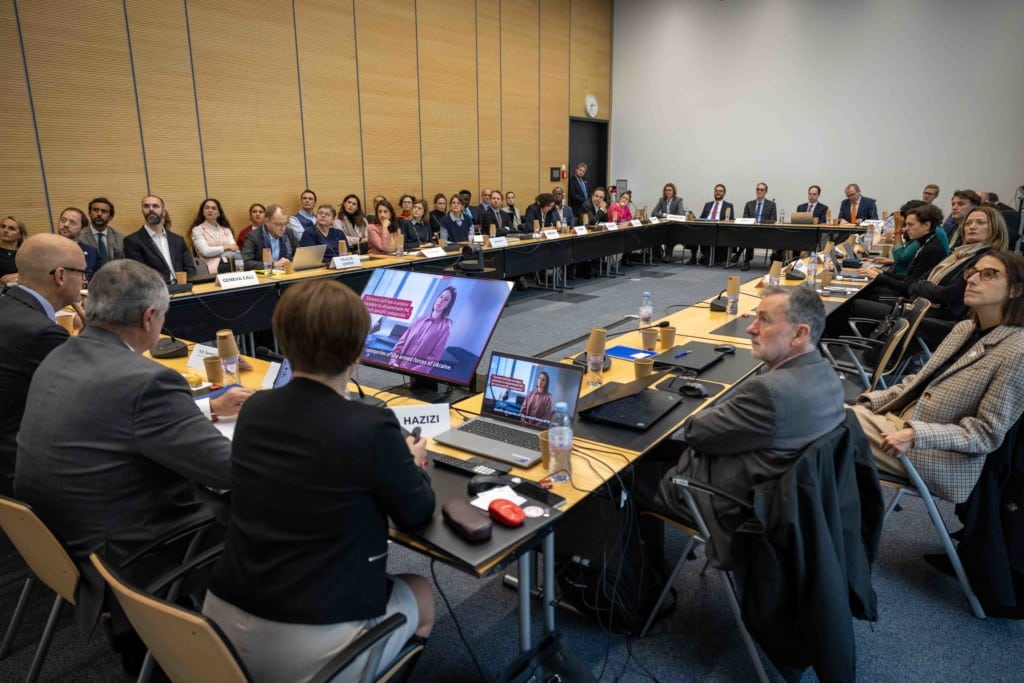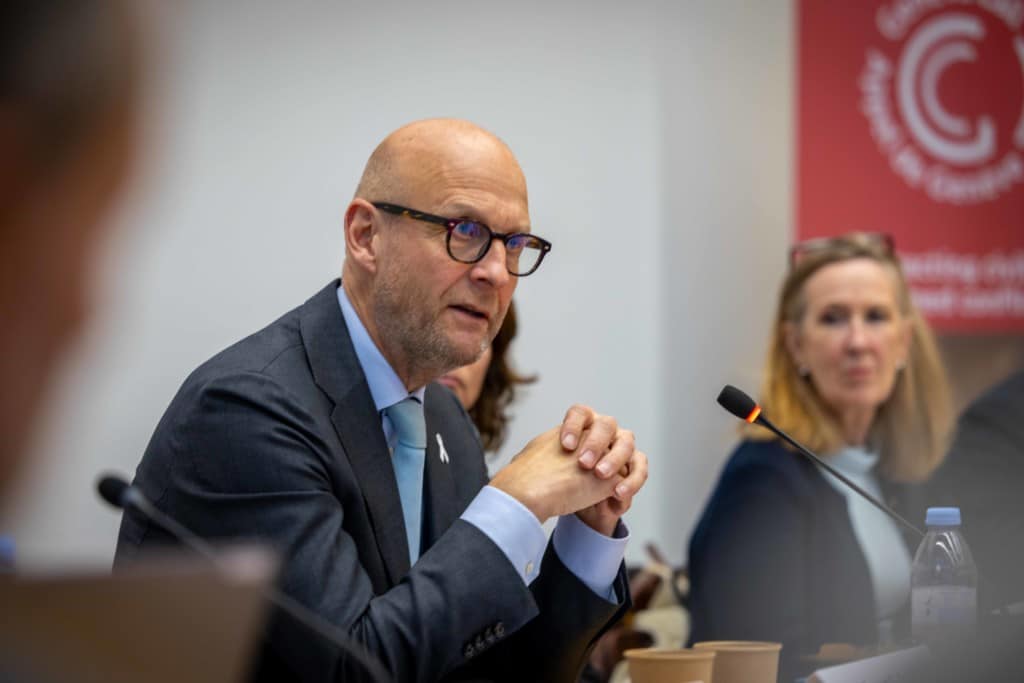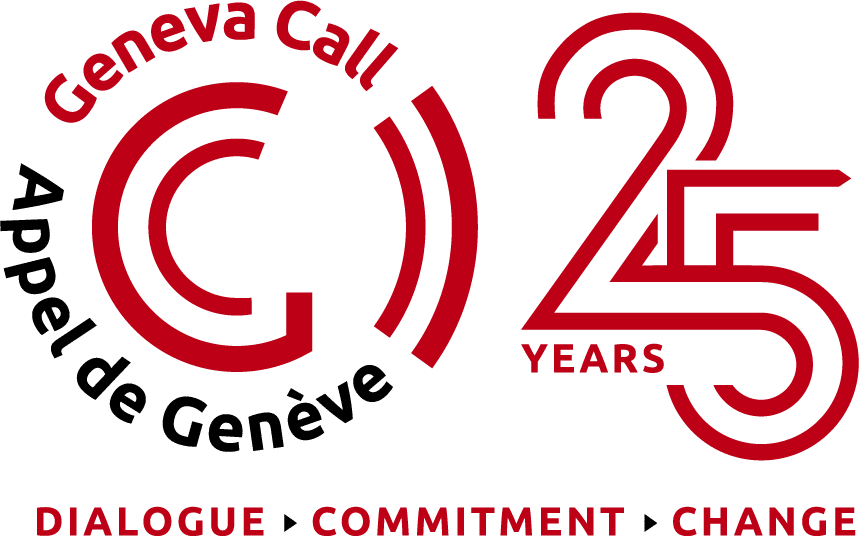
Amid dire global humanitarian landscape, Geneva Call looks ahead to 2025 with renewed support for operations across four continents
25 novembre 2024
Key partners gathered on Thursday for Geneva Call’s 2025 Pledging Conference, where the organization presented its work over the last 12 months and outlined plans for the coming year.
With 210 million people currently living in areas controlled by armed groups and de facto authorities (AGDAs), Geneva Call is committed to protecting civilians and promoting respect for international humanitarian law (IHL) across conflict zones with diverse religious, cultural, and ethnic contexts.
Opening the meeting, Geneva Call General Director Alain Délétroz highlighted the organization’s ambition to strengthen its impact in line with its strategy for 2024-2027, but also pointed to some of the challenges that lie ahead.
“We are all operating in a very difficult environment,” he said. “States are behaving as if IHL is not a priority anymore. And, of course, in the work we do, that has huge consequences. But there is a way forward,” he added.
In her opening remarks, Deike Potzel, Director-General for Crisis Prevention, Stabilization, Peacebuilding, and Humanitarian Assistance at the German Federal Foreign Office, concurred and emphasized the critical role of IHL in protecting civilians.

“Wherever we look, armed violence is on the rise, with devastating effects on civilian populations,” she said. “Civilians are always the first to suffer in war. We need to uphold our humanitarian principles and ensure that assistance is reaching those who need it,” she added. “This is where we need partners such as Geneva Call to continue a constant dialogue with all parties to the conflict.”
Presentations by Director of Operations Atif Hameed and Director of External Relations and Support Services Linda Ryan highlighted the organization’s work to protect civilians in 14 countries across four continents.
In line with its 2024-2027 strategy, Geneva Call engaged with 186 AGDAs to ensure compliance with international humanitarian norms and principles, and the number of armed groups Geneva Call now works with grew in nearly every location. Building relationships and achieving lasting behavior change within these groups requires significant time and energy. Despite the challenges, notable successes included AGDAs committing to the protection of civilians across various thematic areas. Geneva Call also successfully facilitated humanitarian access in hard-to-reach areas, allowing well-recognized humanitarian organizations to deliver critical assistance to those in need. The organization’s efforts were further illustrated by a video focusing on operations in Ukraine, where the country team works with combatants—including many foreign fighters—to enhance their knowledge and understanding of IHL.
Work done in 2024 will help to strengthen operations in 2025. Monitoring, evaluation, accountability, and learning (MEAL) principles were fully implemented into programs in 2024. “We are also moving towards a more specific approach that looks at the different stages of a conflict,” said Director of Operations Atif Hameed. “We see that there are different stages in conflicts, ranging from high intensity to low intensity and transitional phases, and we are looking at how they impact the delivery of our programs and the mechanisms which support our engagement.”
Alongside its wide array of programs in diverse contexts, Geneva Call also showcased its strength and agility as an organization. In 2024, Geneva Call implemented an Enterprise Resource Planning (ERP) system, designed to streamline organizational processes, and took pride in maintaining its ZEWO certification, which recognizes its commitment to transparency, accountability, and impact in humanitarian action.
Linda Ryan, Director of External Relations and Support Services added: “We are building systems, processes, and procedures that bring about a much more valued organization, one that others are turning to—and turning to more and more often.”
After the presentations, the floor was opened to representatives from over 15 donors in attendance, with questions and feedback from the European Union, the United Kingdom, Switzerland, Sweden, Finland, and France, among others.
The 2025 Pledging Conference concluded with remarks from Mr. Tormod Endresen, Ambassador and Permanent Representative of Norway to the United Nations in Geneva, who re-emphasized the importance and universality of international humanitarian norms, even when they are not respected by states and non-state parties to armed conflicts.
Mr. Endresen underlined the need to focus on what can be done to end cycles of violence which pose significant threats to international security. He stressed the importance of considering the interests of non-state parties and all conflict participants in relation to IHL. “This is your niche and we are impressed by how you go about this in a creative way,” he said, praising Geneva Call for its effective approach in this area.

Geneva Call is committed to protecting civilians caught in armed conflicts. Since its inception, the organization has promoted international humanitarian law as a vital tool to uphold human dignity everywhere, and is dedicated to promoting its wider understanding and application by armed groups and de facto authorities.
The organization is deeply grateful to its donors for their ongoing support, generous pledges, and continued commitment to its mission.
